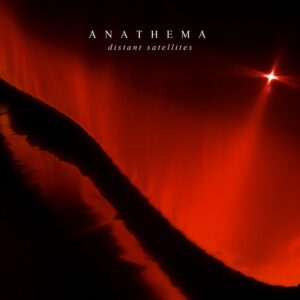Anathema, as they so wonderfully showed on ‘falling deeper’, have always had a knack for writing tunes that burrow deep into the subconscious. Their evolution from purveyors of savagely bleak doom to progressive tunesmiths has been slow, organic and an absolute joy to behold, and ‘Distant Satellites’ is arguably the most perfect distillation of Anathema’s haunting, elegant, quintessentially English music the band have yet produced. The band’s tenth album proper, following on from 2012’s stunning ‘weather systems’, ‘Distant satellites’ is an ambitious, perfectly phrased piece of work that is shot through with the band’s trademark passion and sense of wonder.
Opening with ‘The lost song part 1’, a piece that puts Daniel Cardoso’s drumming to the test, the song is a slow-burning delight that pits the gorgeous harmonies of Vincent Cavanagh and Lee Douglas against a wall of guitars that slowly grows into an unstoppable monster as Vincent sings “the fear is just an illusion.” It is, unquestionably, the most perfectly balanced of Anathema’s recent works with strings adding depth and melody whilst the guitars rage with a muscular might not fully heard on an Anathema record in some years. Flowing from out of the first song comes the gentle acoustic strum of ‘the lost song part 2’, an atmospheric, softly-spoken coda to the energetic exertions of its forebear. It shows that Anathema have lost none of their unique ability to pen music that speaks directly to the listener and when Lee’s lead vocal emerges, it’s impossible not to fall in love with that beautiful voice, singing to you from the shimmering void. As an opening gambit it is a perfect summation of where Anathema stand in 2014, pairing some of the band’s finest musical moments with a sense of child-like wonder that seems so often overlooked in modern music. As guitars and strings coalesce only the coldest heart could fail to swell at the sound, only for it all to drift quietly into the distance leaving the way open for the epic progressive rock of ‘dusk(dark is descending)’ to seep in with minor key discomfort and a taut rhythmic pulse that comes to an abrupt end as Vincent cries out ‘please take me home’ in a manner reminiscent of Roger Waters’ performance on ‘the wall’. Beauty is never far away, however, and whilst the storm clouds may gather, there is always an ‘Ariel’ to soothe the fevered brow, as Lee once again takes the lead over a single piano melody that is deftly built into a piece of sky-scraping beauty that makes you simply glad to be alive. ‘The lost song part 3’ sees Anathema drawing upon Radiohead’s gift for juxtaposing jazzy rhythms with lost-in-the-void melodies and raw emotion, tempering it here with Lee’s effortlessly wonderful vocals and a subtly building cloudburst of guitars that never quite reaches the threatened climax. It’s still unmistakably Anathema, the band having so completely carved their own niche in the world of progressive rock and it leads perfectly to ‘Anathema’, a somnambulant march into a ghostly world where the uneasy trip-hop of Massive attack meets the dark wonder of Pink Floyd and it is marked by a vocal performance that is simply awe-inspiring, Vincent delivering an impassioned performance that makes the hair stand up on the back of the neck.
The second half of the album is marked by a higher level of skittering electronica than previously seen in an Anathema album and what strikes home is how well the band deploys the newer elements. ‘You’re not alone’ is a case in point, a furious blast of echoing vocals and stuttering electronic beats overlaid with spidery guitar work that demonstrates that Anathema are more than capable of wielding a cutting edge when they have a mind to, the song hitting home with real force. ‘Firelight’ forms a brief, beautiful interlude before the title track draws on the atypical beats of Aphex twin as a backdrop for Vincent’s naked vocal. The song draws upon a number of genres to deliver a rich, truly progressive piece of music that is surely an album highlight, the band incorporating tough electronic beats into their music in a manner reminiscent of the climax to Arab Strap’s still peerless ‘girls of summer’. The final track, ‘take shelter’ is a softly-softly lullaby that draws the album to a peaceful, graceful close and you awake, as the disc spins to a halt, from a deeply personal reverie bought on by the power of the wonderful music by which you have just been absorbed.
I have been a fan of Anathema since first encountering the band’s stunning ‘judgement’ album. Since then I have taken the time to roam at will through their back catalogue whilst always awaiting a new record with an increasingly heightening sense of anticipation. It has been an absolute joy to watch the band develop, with each album building upon the lessons learned from the previous effort, always staying true to their own core values and delivering music that, no matter what the genre, is borne from a passion to create something beautiful and lasting. There is no weak entry into Anathema’s collection, but even so, ‘Distant Satellites’ has got to be one of the band’s most eclectic, stunning works and there is no question that the music the band have wrought here will endure long into the future. This is progressive music as it should be – an exploration of the senses conducted by a group of talented, dedicated individuals whose sense of wonder remains undimmed even when faced against the cruelty of the world and the sense of hope and beauty present in every shimmering bar of ‘distant satellites’ makes this as life-affirming as music gets. This is an essential, wonderful masterpiece of an album and, quite possibly, Anathema’s finest, most ecstatic offering yet.




